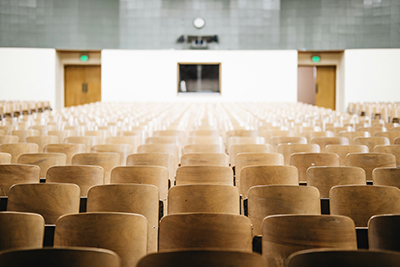Improving Academic Achievement
School Tracking and Self-Perception
Separating students by academic achievement—or tracking—is a controversial policy, in part because of concern that lower-ranked children may feel stigmatized. In a recent working paper, IPR economist Ofer Malamud and his colleagues examine tracking’s effects on students’ self-perceptions in the highly tracked Romanian high school system. The researchers used educational administrative data, including test scores and grades, as well as surveys of 2,865 students and 1,843 of their teachers in 87 schools. There are almost no differences in racial and ethnic characteristics across tracks unlike the U.S., where students who attend low achieving tracks are more likely to be minority or low-income students. Romanian schools track students by a score based on tests and grades, assigning them into either a higher- or lower-achieving class. Ten students out of each class of 28 were asked to rank themselves and their peers on self-confidence, effort, ability, and expected performance. Teachers ranked the same students on the same characteristics. Analysis reveals that students just above the cutoff for the higher-achieving classes had less favorable self-perceptions than those just below in the lower-achieving classes. Students viewed peers in their own class as superior to the other, with the lower-achieving class feeling this more strongly. Students saw themselves more positively than others saw them, especially the lower-achieving students. Teachers’ assessments, when compared to academic outcomes, were far more accurate. The researchers conclude that being assigned to a lower track may not negatively affect students’ perceptions of themselves, at least while they are in high school.
How Educators can Encourage Academic Achievement and College Completion
How students think about themselves in the future can be a motivating factor for higher academic achievement, yet it has been understudied at less selective colleges and online institutions. In Frontiers in Education, IPR social psychologist Mesmin Destin and his colleagues identify whether psychological support,  grounded in appealing to people’s identities, can improve students’ academic performance and motivate them to stay in college. The researchers focused on an understudied body of institutions—online colleges and universities—using two studies. In the first study, out of a group of 1,042 students enrolled in an online math class, 429 were given the opportunity to reflect about their futures as potential college graduates. All the students later completed a survey, and the researchers collected final course outcomes. The second study used the same strategy. However, the researchers sampled 2,515 students across several introductory courses and included surveys at multiple time points. The results of the studies showed that having the opportunity to meaningfully reflect about the significance of graduating college improved grades and persistence in college the next semester. The findings indicate that encouraging college students to intentionally imagine their future selves can support student motivation and success.
grounded in appealing to people’s identities, can improve students’ academic performance and motivate them to stay in college. The researchers focused on an understudied body of institutions—online colleges and universities—using two studies. In the first study, out of a group of 1,042 students enrolled in an online math class, 429 were given the opportunity to reflect about their futures as potential college graduates. All the students later completed a survey, and the researchers collected final course outcomes. The second study used the same strategy. However, the researchers sampled 2,515 students across several introductory courses and included surveys at multiple time points. The results of the studies showed that having the opportunity to meaningfully reflect about the significance of graduating college improved grades and persistence in college the next semester. The findings indicate that encouraging college students to intentionally imagine their future selves can support student motivation and success.
Concerns About Downward Mobility Among Students of Color
What impact do concerns about downward socioeconomic mobility have on college students’ academic experiences? IPR social psychologist Mesmin Destin, graduate research assistant Josiah Rosario, and their colleagues conduct two studies addressing this question in Social Psychology of Education. In their first study, the researchers found that when students had stronger concerns about the possibility of falling down the socioeconomic hierarchy during their lives, they also expressed more academic avoidance goals, which means that they were more focused on avoiding negative goals like bad grades than achieving positive goals like earning honors. This was especially true for students of color. In an experiment, the second study randomly assigned students to momentarily focus on the possibility of downward mobility, upward mobility, or a control condition. Building on the findings from the first study, students of color who were led to focus on downward mobility became more focused on avoidance goals than other students in the study. Prior research shows that over time, this type of sustained focus on avoiding mistakes rather than learning and improving can lead to lower effort, achievement, and well-being. The researchers conclude that broader societal risks of downward mobility for students of color can contribute to challenges that they face in pursuing their goals.